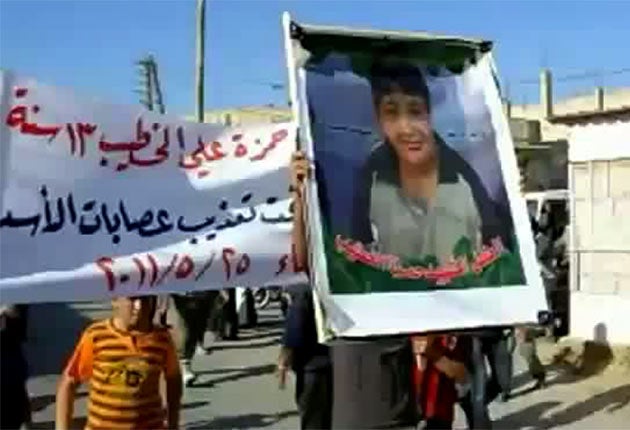The face of the Syrian uprising
As President Assad offers an amnesty to protesters, footage is released of the mutilated corpse of a teenage boy

Your support helps us to tell the story
From reproductive rights to climate change to Big Tech, The Independent is on the ground when the story is developing. Whether it's investigating the financials of Elon Musk's pro-Trump PAC or producing our latest documentary, 'The A Word', which shines a light on the American women fighting for reproductive rights, we know how important it is to parse out the facts from the messaging.
At such a critical moment in US history, we need reporters on the ground. Your donation allows us to keep sending journalists to speak to both sides of the story.
The Independent is trusted by Americans across the entire political spectrum. And unlike many other quality news outlets, we choose not to lock Americans out of our reporting and analysis with paywalls. We believe quality journalism should be available to everyone, paid for by those who can afford it.
Your support makes all the difference.The Syrian President, Bashar al-Assad, appeared on state television last night to offer a general amnesty to protesters who have taken to the streets for the past two months to call for an end to his rule.
Even as the President was speaking his security forces, which have cracked down on the demonstrations, showed no sign of stopping their bombardment of the central town of Rastan, launching volleys of shells and firing machine-guns at homes and buildings. At least one person was killed, according to human rights activists.
Army units began operations in Rastan and nearby Talbiseh on Monday. Civilians in the two towns, both a short distance from Homs – one of the centres of the opposition movement – came under heavy artillery fire as tanks and troops encircled the area. Last night there were reports that snipers had been positioned on rooftops in Rastan.
The television report said the President's amnesty covered what it described as crimes committed before 31 May. It could affect 10,000 people who have been rounded up during the protests, say activists.
This latest offer comes on the first day of an opposition-sponsored conference in Turkey. Those in attendance at the conference in Antalya said the meeting was an opportunity to show a unified front in solidarity with Syrian activists – though, in a reflection of some of the differences which exist between exiles, a number of figures did not attend.
Mohamad Al-Abdallah, a blogger once jailed by the Baathist regime for forming a committee to help the families of political prisoners inside Syria, was among those attending. He told The Independent that the eyes of the Syrian people were on the conference.
"Everybody feels responsible for the people in Syria," he said. "But we're not here to form any kind of political group like the Libyan opposition. That's not on the table."
Mr Assad, and his father before him, have ruled Syria for 40 years.
Activists say that 16 people have been killed during the heavy crackdown in Homs province in recent days. The violence in Rastan and Talbiseh followed a wave of public revulsion inside Syria over the highly publicised death of Hamza Ali al-Khatib, a 13-year-old boy from the beleaguered southern city of Deraa.
Hamza was among a group of people detained at the end of April when they participated in a demonstration in the town of Jiza. His family heard nothing about his whereabouts until last week, when officials reportedly arrived at their home and told them they could have Hamza's body back if they agreed not to publicise his death.
They consented, but were so horrified by the condition of the child's body when it was returned to them that they made contact with a human rights activist, who videoed the body and uploaded the footage on to YouTube.
The film, which has now been seen by thousands of people, shows Hamza's bloated and mutilated body in unflinching detail. As the camera pans over his corpse it reveals gunshot wounds, burns and a number of bruises inflicted by the young boy's torturers – presumably belonging to a branch of Syria's feared intelligence services. His penis has been severed.
According to a Syrian journalist based in Damascus, who asked not to be named because of fears over his safety, Hamza Ali al-Khatib has become the "face of the Syrian uprising".
"People are now protesting for him on a daily basis. Hamza has changed the attitudes of the nation, with more people who were pro-regime becoming anti-regime." He added that people inside Syria saw the young boy in the same light as Khalid Saeed, the Egyptian man who was beaten to death by police last year and whose case galvanised the opposition movement.
Razan Zaitouna, a human rights lawyer based in Syria, said: "The case of Hamza showed people that it could be their kids or family who are taken by the Syrian regime and that it's not safe anymore. It shocked everyone who had not made their minds up about what was happening."
According to Wissam Tarif, executive director of Insan, the Syrian human rights organisation, a number of protests have taken place across Syria this week that appear to have been triggered by the death of Hamza Ali al-Khatib.
"Hundreds of people walked through the streets in Damascus and Latakia carrying pictures of Hamza. People have gone on to the rooftops and shouted, 'Allahu Akbar, Hamza Hamza'. He has become a symbol for the revolution."
Last week, Amnesty International published a video purporting to show security forces shooting protesters dead, and attacking those that lay injured in the streets. The Syrian government has consistently refused to issue visas to the international media.
Join our commenting forum
Join thought-provoking conversations, follow other Independent readers and see their replies
Comments